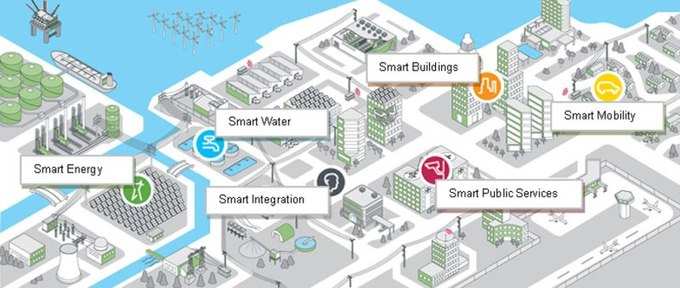 The Cabinet on Wednesday cleared
The Cabinet on Wednesday cleared It also cleared the
PM Modi had announced his vision to set up 100 smart cities across the country soon after his government was sworn into power mid last year. Since then a race has been on among cities to land on the smart cities list that the ministry of urban development is compiling.
Pratap Padode, Founder Director, Smart Cities Council India, said the move will give a much needed thrust to the urban renewal JNNURM programme that went cold under the previous government. "Efficiency and sustainability will be of major focus in the establishment of smart cities. Accountability will be the most important factor in fund disbursal to the states and it will based on the time bound completion of projects," he said.
Under the Smart Cities Mission, each selected city would get central assistance of Rs 100 crore per year for five years. Each Smart City aspirant will be selected through a 'City Challenge Competition' intended to link financing with the ability of the cities to perform to achieve the mission objectives. "Each state will shortlist a certain number of smart city aspirants as per the norms to be indicated and they will prepare smart city proposals for further evaluation for extending central support," said a statement from the ministry of urban development.
The 100 smart cities mission intends to promote adoption of smart solutions for efficient use of available assets, resources and infrastructure with the objective of enhancing the quality of urban life and providing a clean and sustainable environment, it said.
Under this mission, special emphasis will be given to participation of citizens in prioritizing and planning urban interventions. This will be implemented through an 'area based' approach consisting of retrofitting, redevelopment, pan-city initiatives and development of new cities.
Under retrofitting, deficiencies in an identified area will be addressed through necessary interventions, as was done in the case of downtown Ahmedabad.
Redevelopment enables reconstruction of already built-up area that is not amenable for any interventions to make it smart as in the case of Bhendi Bazar in Mumbai and West Kidwai Nagar in New Delhi. Larger city-wide components could be interventions like Intelligent Transport Solutions that benefit all residents by reducing commuting time.
Explaining the features of the smart cities initiative, the statement said that the focus will be on core infrastructure services like adequate and clean water supply, sanitation and solid waste management, efficient urban mobility and public transportation, affordable housing for poor, power supply, robust IT connectivity, governance, especially e-governance and citizen participation, safety and security of citizens, health and education and sustainable urban environment.
"The
The two missions approved by the Cabinet today are interlinked in many ways.
AMRUT adopts a project approach to ensure basic infrastructure services relating to water supply, sewerage, storm water drains, transport and development of green spaces and parks with special provision for meeting the needs of children. Implementation of this mission will be linked to promotion of urban reforms such as e-governance, constitution of professional municipal cadre, devolving funds and functions to urban local bodies, review of building bye-laws, improvement in assessment and collection of municipal taxes, credit rating of urban local bodies, energy and water audit and citizen-centric urban planning in cities other than the 100 smart cities.
Under this mission, 10% of the budget allocation will be given to states/union territories as incentive based on achievement of reforms during the previous year.
This mission will be implemented in 500 cities and towns each with a population of one lakh and above, some cities situated on stems of main rivers, a few capital cities and important cities located in hilly areas, islands and tourist areas.
Under this mission, states get the flexibility of designing schemes based on the needs of identified cities and in their execution and monitoring. States will only submit State Annual Action Plans to the centre for broad concurrence based on which funds will be released but in a significant departure from JNNURM, the central government will not appraise individual projects.
Central assistance will be to the extent of 50% of project cost for cities and towns with a population of up to 10 lakhs and one-third of the project cost for those with a population of above 10 lakhs. Central assistance will be released in three instalments in the ratio of 20:40:40 based on achievement of milestones indicated in State Annual Action Plans.
The thinking behind AMRUT is to lay a foundation to enable cities and towns to eventually grow into smart cities.
The Cabinet has also approved central
While the government will put in Rs 1 lakh crore under the two missions, states and urban local bodies would mobilise matching resources for development of urban areas over the next five years, taking the total flow of investment close to Rs 2 lakh crore. In addition, substantial private